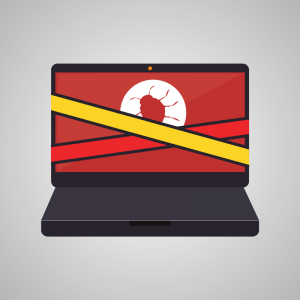
Preventing cybercrime is becoming more and more important as technology improves and the cybercriminal industry grows. Cybersecurity is arguably the most important aspect of any business plan. Businesses, especially small businesses simply cannot survive a major data disaster. The prevention of disasters like these is the best, and cheapest, way to keep ahead of the dangerous pack of cybercriminals determined to steal money directly out of your pocket.
Improving your company’s cybersecurity is not one big effort - but several small ones. These four "don’ts" below will help you and your staff to keep cybercriminals out of your network and out of your pockets.
Don’t use the same password for everything.
Ideally, every single username/password combo will be as different as you can make them. Of course, you should never use the same password as a coworker. You should also never use your coworker’s login information to log in a computer. This sharing of sensitive information makes your network weak.
It’s also vital to craft passwords that are up to industry standards. Choosing a strong password is your first line of defense when it comes to unauthorized access to your computer or network. Using passwords that are easy to guess (many cybercriminals actually have computers that use algorithms to guess your passwords) is setting yourself up for an attack. Use a password manager for ones that you can’t memorize - don’t leave the password written on a sticky note at your desk.
Don’t ignore updates or patches.
We get it - updating Java or your anti-virus software can get annoying and frustrating. It happens so often! However, whether it's an update to your cell phone, your operating system, or a software application you should always keep them up to date.
These updates and patches have very important jobs to do. A large chunk of these updates are centered on cybersecurity - the newer versions will block newer viruses and malware. They seal up holes in the applications or software that were used to gain illegal access. Every day, cybercriminals find new ways to access networks and gain control of data - updates and patches help keep those criminals out.
Don’t let strangers use your network or hardware.
You probably wouldn't hand your credit card to a stranger - so don't do it with your WiFi network or your laptop. It may come across as rude, but firmly deny access to anything electronic you own that could provide a stranger with information about you. Your phone, your computer, your WiFi password, etc.
Make sure you trust the person using your laptop as much as you’d trust them with your credit card. It’s essentially the same thing - having access to your network or hardware is giving a stranger access to some very intimate details about your life. If you’ve ever shopped or banked online, they can get your bank information. They can access your email address. If you’re on a shared network at your office, they may be able to find the W-2s of every employee or the sensitive client information stored there.
Don’t try to prevent cybercrime on your own.
Preventing cybercrime is not easy, so it’s best to let an IT support team handle it. This is a big job, so let the professionals help you out. You're an expert at your job, and we're an expert at ours. Our job is to protect our clients from cybercrime. We can provide you with the training and tools you need to keep cyber attacks from happening to you and your company. Plus, in the event a cyber attack does happen, we can help you recover from it.



